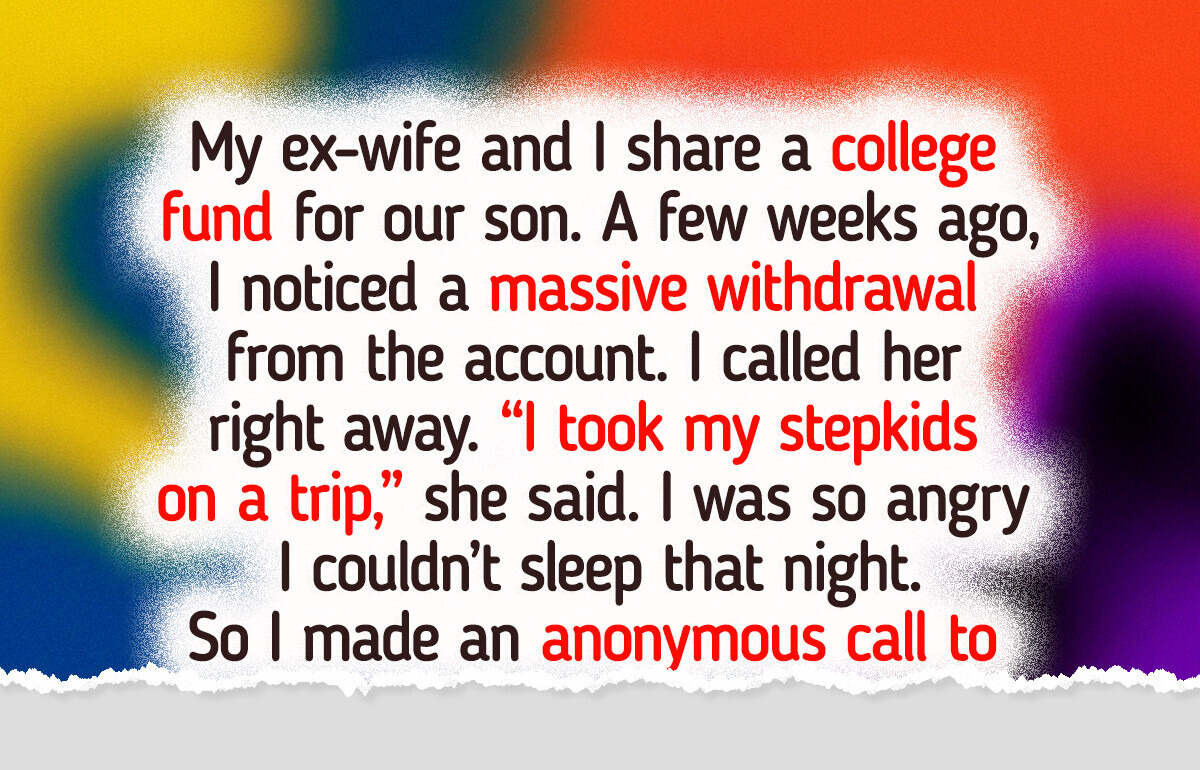Get a lawyer. And close the account and open a new one in your name.
My Ex-Wife Put Her New Family Above Our Son’s Needs, I’m Furious

One of our readers reached out with a story that left him feeling helpless and betrayed. What began as a typical co-parenting conflict quickly spiraled into something much deeper. When a large sum suddenly vanished from the account, what followed wasn’t just financial betrayal. It was emotional manipulation.
Now, torn between preserving his child’s trust and exploring his legal rights after divorce, he’s stuck in a heartbreaking dilemma. This is one of those real-life divorced parenting stories where the line between right and wrong isn’t always clear.
Here is his letter:
Hello Bright Side,
I’m in a situation with my ex-wife that I don’t know how to solve. I’ve always read your articles about people’s challenging times, and now I guess it’s my turn.
My ex-wife and I share a college fund for our son. A few weeks ago, I noticed a massive withdrawal from the account. I called her right away. “I took my stepkids on a trip,” she said.
I was so angry I couldn’t sleep that night. So I made an anonymous call to a lawyer. I didn’t want to escalate things, but I needed to know what rights I had.
I asked my ex to return the money she took from our joint account. “It’s our son’s college fund,” I reminded her. She laughed and said, “He’ll be fine, he’s smart. He’ll get scholarships.” I was speechless.
And the worst part? She told our son that she made the withdrawal for him. She told him it went into her husband’s business and that they’re “investing for his future.”
Now my son keeps saying things like, “It’s okay, Dad. Mom says the money’s gonna double. I’ll have even more by the time I graduate.” He thinks I’m the bad guy for being upset.
And I can’t even blame him because he’s just repeating what she told him. I’m torn. If I press legally, it’ll break my son’s trust. But if I stay quiet, she gets away with it—and he may have no college money left when the time comes.
Should I confront her again?
Sincerely,
Kevin
Thank you, Kevin, for trusting us enough to share this difficult situation. We have gathered tips and tricks to help you cope with what you’re facing right now.
Building trust in co-parenting.
Building trust in co-parenting starts with open, honest communication and mutual respect. Both parents should feel comfortable expressing concerns, sharing information, and making important decisions together.
Trust develops when there’s transparency, reliability, and a genuine effort to prioritize the child’s wellbeing. Respecting each other’s boundaries, keeping promises, and showing consistent behavior all help create a stable and cooperative parenting dynamic.
Practicing healthy communication with ex-partner.
Effective communication is key to successful co-parenting, but it requires honesty about your own emotional limits. If emotions are running high, it might be best to avoid direct conversations until things cool down. Still, it’s important to keep communication open and focused on the children.
Shutting down dialogue to punish your co-parent only harms the kids and sets a poor example. Children learn how to handle conflict by watching how their parents interact.
Keeping the father-son bond.
It’s important that you don’t let this get in between you and your son. Building a strong father-son bond starts with spending quality time together, even through simple daily routines. Shared activities like sports, reading, or just talking can deepen your connection and create lasting memories. Being emotionally available is just as important.
Let your son see that it’s okay to express feelings. Encouraging his interests, even if they differ from yours, shows respect and support. Consistent involvement and positive reinforcement help build his confidence and trust in you. Most importantly, lead by example—your actions teach him how to treat others and handle life’s challenges.
Setting financial boundries while co-parenting.
After a divorce or separation, financial stability becomes a major concern, especially when you’re suddenly managing expenses and assets alone or building a trust fund for your child. Understanding your legal rights around property, child support, and spousal support is crucial to ensure fairness in what you owe and receive.
Creating a realistic budget can help you manage daily expenses while saving for future needs like retirement or your child’s education. Starting an emergency fund is also key, as unexpected costs can appear at any time. If the process feels too complex, consulting a financial advisor can help you build a plan that fits your new life.
Don’t avoid confrontation.
Finally, do not avoid confrontation with your ex-partner. While it may reduce tension in the short term, avoiding conflict can lead to resentment, poor communication, and unresolved issues. Over time, this behavior can damage relationships and erode self-esteem.
People who avoid conflict may struggle to set boundaries or express emotions clearly. Learning healthy ways to face disagreements can lead to stronger, more honest connections with others.
Discover the common habits that could be holding your child back. See if you’re unknowingly setting them up for financial struggles and learn how to change course today.
Comments
Related Reads
I Saved for Years for College—Then My Dad Took It All, His Reason Left Me Speechless

11 People Who Chose Humanity Over Hatred in the Darkest Moments

A Stranger Humiliated My Daughter at Disney World—He Picked the Wrong Mom to Mess With

I Refused to Pay for Our Valentine’s Dinner—Then I Learned the Heartbreaking Truth

10 Hospital Workers Who Prove Kind Heart Is a Powerful Medicine

11 Times People Showed That Real Courage Isn’t Loud—It’s Kind

12 Times Blended Families Learned That Love Doesn’t Need DNA

My MIL Stole My Daughter’s $50K College Fund—The Consequences Were Immediate

I Refused to Talk to My Parents After They Chose My Ex-Wife Over Me

I Refuse to Let My Stepson Disrespect Me, His Arrogance Cost Him Big

I Refuse to Let My Daughter Attend Her Dad’s Wedding

I Gave My MIL a Simple Gift—But My Family Demanded I “Choose a Side”






